
The Indonesian National Party was the name used by several nationalist political parties in Indonesia from 1927 until 1973. The first PNI was established by future President Sukarno. After independence, the new PNI supplied a number of prime ministers, and participated in the majority of cabinets in the 1950s and 1960s. The party was fused into the Indonesian Democratic Party in 1973. In the years following the reforms of the late 1990s, a number of parties claiming to be the continuation of previous PNIs stood in elections, but gained only a handful of seats.
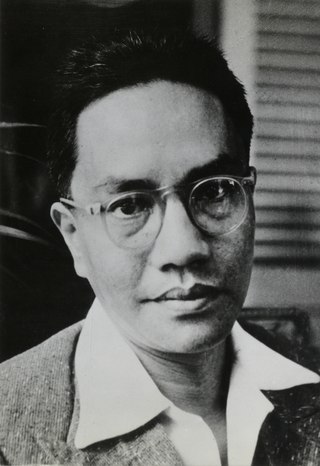
Amir Sjarifuddin Harahap was an Indonesian politician and journalist who served as the second prime minister of Indonesia from 1947 until 1948. A major leader of the left wing during the Indonesian National Revolution, he previously served as Minister of Information from 1945 until 1946 and Minister of Defense from 1945 until 1948. Amir was born into the Sumatran aristocracy and was educated at Leiden University. At Leiden, he became a member of the board of the Gymnasium student association in Haarlem and was involved in the Batak student organization Jong Batak. He returned to Indonesia due to family troubles but continued his education at the Rechts Hogeschool in Batavia.

The Council of Indonesian Muslim Associations Party, better known as the Masyumi Party, was a major Islamic political party in Indonesia during the Liberal Democracy Era in Indonesia. It was banned in 1960 by President Sukarno for supporting the PRRI rebellion.

The Liberal Democracy period in Indonesia, also known as the Era of Parliamentary Democracy, was a period in Indonesian political history, when the country was under a liberal democratic system. During this period, Indonesia held its first and only free and fair legislative election until 1999, but also saw continual political instability. The period began on 17 August 1950 following the dissolution of the federal United States of Indonesia, less than a year after its formation, and ended with the imposition of martial law and President Sukarno's decree, which resulted in the introduction of the Guided Democracy period on 5 July 1959.

Burhanuddin Harahap was an Indonesian politician and lawyer who served as prime minister of Indonesia from August 1955 until March 1956. He was a member of the Masyumi Party and served as Minister of Defense concurrently with his tenure as prime minister. Afterward, he took part in the unsuccessful Revolutionary Government of the Republic of Indonesia (PRRI) rebellion in West Sumatra.
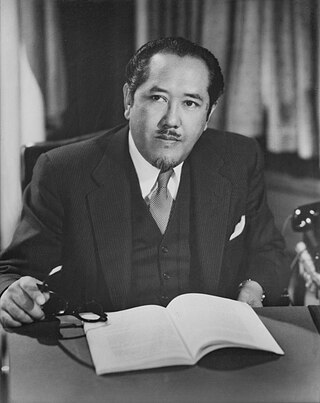
Ali Sastroamidjojo was an Indonesian politician and diplomat. He served in various political and diplomatic roles during the presidency of Sukarno, most notably as a cabinet minister, prime minister, chairman of the Indonesian National Party (PNI), and permanent representative to the United Nations. Ali was born in Grabag, Purworejo, Dutch East Indies, to an aristocratic family from Magelang and studied at Leiden University. During his studies, he was active in several youth organizations, including the Jong Java and the Perhimpoenan Indonesia associations. He was briefly arrested by the Dutch in 1927 but was released shortly thereafter.

The First Hatta Cabinet was Indonesia's seventh cabinet. It was formed by Vice President Mohammad Hatta, who was instructed to do so by President Sukarno on 23 January 1948, the same day the previous cabinet was declared dissolved. Following the second Dutch military aggression, when the republican capital of Yogyakarta was seized and most of the cabinet arrested, much of the cabinet was captured and sent into exile, although it was not formally disbanded. After the political leadership returned effective 13 July 1949 the cabinet continued its mandate until it was reshuffled on 4 August.

The Second Hatta Cabinet was Indonesia's ninth cabinet. It was formed after the Indonesian leadership, which had been imprisoned by Dutch forces, returned to the capital, Yogyakarta. It served from 4 August to 20 December 1949.

Soekiman Wirjosandjojo was an Indonesian politician and physician who served as prime minister of Indonesia from 1951 until 1952. Additionally, Soekiman served as the first president of the Masyumi Party from 1945 to 1951.

Indonesian Islamic Union Party was an Islamic political party in Indonesia before and after independence. In 1973 it was merged into the United Development Party.
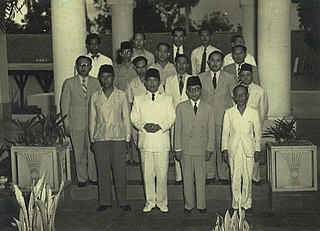
The Soekiman Cabinet, also known as the Sukiman-Suwirjo Cabinet, was an Indonesian cabinet that served from 27 April 1951 until it fell on 23 February 1952 following revelations that it had signed a mutual security agreement with the United States, and was dissolved on 3 April 1952.

The Wilopo Cabinet, also known as the Wilopo-Prawoto Cabinet, was an Indonesian cabinet that served from 3 April 1952 until 30 July 1953.

Kanjeng Raden Mas Tumenggung Wongsonegoro, more commonly known simply as Wongsonegoro, was an Indonesian politician, who served as the Deputy Prime Minister of Indonesia, alongside Zainul Arifin under Prime Minister Ali Sastroamidjojo, and the Governor of Central Java during the Indonesian National Revolution. He also served as minister in the Indonesian government several times, including as Minister of Home Affairs, Minister of Justice, and Minister of Education.

Sartono was an Indonesian politician and lawyer who served as the first speaker of the People's Representative Council (DPR) from 1950 until 1960. Born to a noble ethnic-Javanese family, Sartono studied law at Leiden University. During his studies, he joined the Perhimpoenan Indonesia association and became an advocate for Indonesian independence. After graduating, he opened a law practice and helped found the Indonesian National Party (PNI) in 1927. When several party leaders were arrested by the colonial government in 1929, he became one of their defense lawyers and unsuccessfully argued for their acquittal. Following the arrest of its leaders, PNI became paralyzed and the party subsequently suspended its activities. In its place, Sartono founded a new political party, Partindo, which sought to achieve independence through non-cooperation and mass action. Partindo lasted until 1936, when it decided to dissolve itself. After Partindo's dissolution, Sartono helped found another party, Gerindo, which advocated for the creation of an Indonesian parliament.
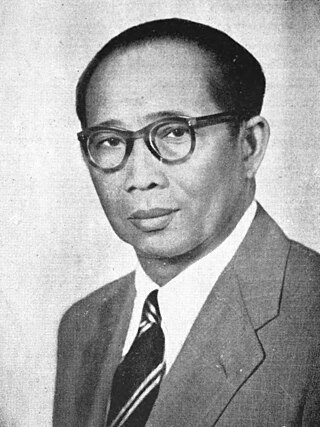
Sidik Djojosukarto was an Indonesian politician who served as chairman of the Indonesian National Party (PNI) from 1950 until his death. As PNI chairman, he was revered by all party factions, and was the closest to being an "authentic party hero."

Oetarjo Anwar Tjokroaminoto was an Indonesian politician and journalist. He served as Minister of Social Affairs for a year in the Wilopo Cabinet and was the Prime Minister of Pasundan for less than a month during January 1950.

The 17 October affair was an event during which Indonesian soldiers pressured the president to disband the Provisional People's Representative Council, at the behest of the administration's chief of staff, along with the commander of the armed forces. The demand was made of President Sukarno while the Merdeka Palace was surrounded.

Iskaq Tjokrohadisurjo was an Indonesian politician and advocate. A member of the Indonesian National Party, he served as Minister of Economic Affairs and Minister of Home Affairs during the 1950s. Hailing from Jombang Regency and being educated in law, he received higher education at Leiden University after a five-year career in various colonial courts. Iskaq was one of the earliest native Indonesian advocates during the Dutch colonial period, founding multiple law offices across the country. He also took part in the nationalist movement, being a co-founder of the Indonesian National Party and being arrested along with its other leaders in 1929.
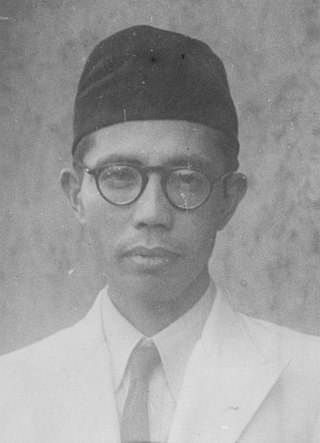
Jusuf Wibisono was an Indonesian politician and economist. A member of the Masyumi Party, he served as Minister of Finance from 1951 until 1952 and again from 1956 until 1957, under the Soekiman and Second Ali Sastroamidjojo cabinets. Originating from Magelang, Wibisono took part in Islamic organizations in the nationalist movement from his school years. He joined Masyumi during the Indonesian National Revolution, and became a leading member within the party despite disagreements with other party leaders such as Mohammad Natsir. In both of his tenures as finance minister, he relaxed the tight budgetary controls of his predecessor, and provided favors to political parties.

Prawoto Mangkusasmito was an Indonesian politician who served as the final chairman of the Masyumi political party before its dissolution in 1960. He also served as the Deputy Prime Minister of Indonesia during the Wilopo Cabinet between 1952 and 1953.




















